高考英语80个重要句型精讲七
高考英语必考80个重要句型精讲【H】

句型71几种重要的同位语从句:(1) 由where 引导例:The suggestion where we should build our new factory should beconsidered. 那个我们应该在哪儿建造厂房的建议应该给予考虑。
(2) 由what引导例:I have no idea what he did. 我不知道他做了什么。
(3) 由whether 引导例:The question whether he’ll attend the meeting is not decided.他是否会参加会议这个问题还没决定。
(4) 由who引导。
例:The question who will go abroad needs considering.谁将去国外这个问题需要考虑。
(5) 由when 引导例:I have no idea when they will be back and settle down.我不知道他们什么时候回来定居。
(6) 由that 引导例:The suggestion that the students should have plenty ofexercise is verygood. 学生应该有很多练习,这个建议不错。
(7) 由how 引导例:He can’t answer the question how he got the money.他是怎样得到那钱的,他不能回答这个问题。
(8) 由why 引导例: We don’t understand the problem why this is the best choice.我搞不懂这个问题,为什么这是最好的选择。
句型72with复合宾语句型(1) with + n + adj.例:He stared at me with his mouth open. 他张着嘴凝视着我。
(2) with + n + adv例:The boy stood there, with his head down. 这男孩低着头站在那。
高考英语总复习语法专项突破精讲:第七讲 形容词和副词

6.平级比较
用 as...as,not as/so...as,the same as,such...as 引导。
考
点
①Henry is a worker as good as Peter(is).
探 究
整
=Henry is as good a worker as Peter(is).
合
语
法
=Henry is such a good worker as Peter(is).
第七讲 形容词和副词
考
点
探
究
整
合
语 法 巩 固 演 练
考点一 倍数表达法
考
点
探
究
1.(2011·陕西卷)The new stadium being built for the next Asian
整 合
语
Games will be________the present one.
法
巩
固
A.as three times big as
巩 固
演
练
所有的辛苦最终都是值得的。hopefully 满怀希望地;normally 正常
地;thankfully 感激地;conveniently 方便地。根据句意判断,答案
为 C 项。
答案:C
2.Having been praised by the teacher,the little girl ran back
巩 固
演
Henry 和 Peter 一样都是好工人。
练
【注意】 (1)as...as 中间使用名词要遵循以下原则:
aass++形ma容ny词++复a数n名+词单+数a名s 词+as
高三英语高考必考80个重要句型精讲(二)

Whichever (=No matter which) of them you many choose, the quality will be the same.
他们当中不论你选哪一个,品质都一样。
However (=No matter how) hard I have tried, I can
光运行非常快,我们几乎无法想
否定意义的副词或短语放在句首, 句子半倒装。 这样的副词主要有: little, seldom, hardly, rarely, scarcely, never, not at all, by no means(决不) , at no time(在任何时候都不) , nowhere, in no case (无论如何都不 ); not in the least (=not at all) , on no condition (决不) 等。
“ only + 状语”放在句首,句子半倒装 [ 例句 ] Only when the war was over did he return to work. 直到战争结束他才回去工作。 Only after you have reached eighteen can you join the army. 你只有到了 18 岁才能参军。 Only in that way will we be ready for the challenges and opportunities in life. 只有这样,我们对生活中的机遇和挑战才会有充分的准备。 Only by changing the way we live will we be able to save the earth. 只有改变生活方式,我们才能拯救地球。 [注意 ]这种结构的倒装只在 only 引导状语的时候使用, only 引导主语的时候不用倒装。 Only in this way can you work out the problem. 你只有用这种方法才能做出题目。 Only this way can help you work out the problem. 只有这种方法才能帮你做出题目。 句型 29 半倒装句(五)
高考英语固定句型知识点单元汇编含解析(7)

高考英语固定句型知识点单元汇编含解析(7)一、选择题1.Jenny was fined, because she was driving ________ she couldn’t stop at the red light. A.too fast that B.so fast thatC.such fast that D.as fast as that2.Helen was about to walk out of the door________ the telephone rang.A.when B.then C.while D.that3.It is only when people live on à very limited diet_________ it is necessary to make a special effort to supply the missing vitamins.A.so B.that C.since D.until4.This was the first time that she _________by the beauty of the West Lake.A.was fascinated B.had been fascinated C.has been fascinated D.fascinated5.As a result, he became ________ looking upward ________ he received a letter during that period, he had to hold it over his head to read it.A.used to…when B.so used to…t hatC.so used to…as when D.so used to…that when6.He never wrote ________ his first one again.A.as good book as B.such good a book asC.so good a book as D.such good book as7.It was the first time in my life that I________ the Great Wall. You can’t imag ine how excited I felt!A.had visited B.visitedC.visit D.have visited8.This is the first time that I ________at the meeting.A.had spoken B.have spoken C.am D.was9.I think the Brazilian team is the strongest team and there is that it will win the 2022 World Cup.A.no way B.no problem C.no doubt D.no wonder 10.You’d better try ______ second time if it is ______ first time that you ____.A.the; the; fail B.a; the; have failedC.a; the; should fail D.the; a; fail11.The police __________ the murderer everywhere when he suddenly appeared in a theatre. A.is searching B.were searching C.are searching for D.were searching for 12.It is the first time that I ______ to Beijing.A.came B.comeC.have come D.had come13.It will be many years ______ the doctors and medical scientists can find _____ for cancer. A.since; cures B.when; treatmentsC.before; cures D.until; treaments14.He could do nothing but __________ for the bus ___________.A.to wait; coming B.to wait; to come C.wait; coming D.wait; to come 15.Which of the following sentences is CORRECT?A.Do you think who will join us tomorrow?B.Where do you guess will be the next stop for their journey?C.How many people you consider will be given the chance to attend the class?D.What do you suppose will Jim bring to us when he arrives?16.If you missed the Shopping Carnival “Double 11”, it wouldn’t be long ______ you get another one, “Double 12”.A.though B.when C.before D.as17.He is rich and brave. __________ is no wonder he is popular with girls.A.There B.That C.It D.What18.To solve the shortage of electricity,the government has taken some measures, but it will be some time________the situation returns to normal.A.since B.when C.before D.unless19.- Haven’t seen you for ages. Do you still work in Shenyang?- No, I don’t. It’s two years ________ I worked there.A.before B.as C.when D.since20.—Do you know anything about the school?—Yes. In fact,this is the third time I here.A.wasB.cameC.have beenD.will come21.I had hardly rung the bell ________ the door was opened suddenly, and my son rushed out to greet me.A.before B.untilC.as D.since22.It is time that the government _____ measures to protect the valuable heritage.A.takes B.to take C.take D.took23.Peter had been puzzled over the problem for over an hour___________ all at once the solution flashed across his mind.A.when B.while C.then D.as24.________ that the small village ________ him. He knows almost everything about it. A.There is no doubt; is familiar with B.There is no doubt; is familiar toC.It is no doubt; is familiar with D.It is no doubt; is familiar to25.It won’t be long __________ our winter vacation begins, but my vacation plans are still up in the air.A.when B.until C.that D.before【参考答案】***试卷处理标记,请不要删除一、选择题1.B解析:B【解析】【详解】考查固定句型。
高考英语必考80个重要句型精讲【E】

句型41prefer(1) prefer to do sth例:I prefer to stay at home. 我宁愿呆在家里。
(2) prefer doing sth例:I prefer playing in defence. 我喜欢打防守。
(3) prefer sb to do sth例:Would you prefer me to stay? 你愿意我留下来吗?(4) prefer to do sth rather than do sth ……宁愿…...而不愿.…".例句:I prefer to stay at home rather than go out我宁愿呆在家里而不愿出去.(5) prefer doing sth to doing sth例:I prefer watching football to playing it.我喜欢看篮球,不喜欢打篮球。
(6) prefer sth to sth例:I prefer tea to coffee. 我要茶不要咖啡。
句型42seem(1) It +seems + that从句例:It seemed that everyone was satisfied. 看来好像每个人都很满意。
(2) It seems to sb that ---例:It seems to me that she is right. 我看她是对的,(3) There seems to be ----例:There seems to be a heavy rain. 看上去要有一场大雨。
(4) It seems as if ----例:It seemed that she couldn't come to class.看样子她不能来上课了。
句型43表示“相差……;增加了……;增加到……”句型:(1) She is taller than I by three inches. 她比我高三英寸(2) There is one year between us. 我们之间相差一岁。
2010高考英语必考80个重要句型精讲

高中80个重要句型句型1would rather that somebody did…“宁愿……;更愿意……”(表示现在或将来的愿望) would rather that somebody had done…“宁愿……;更愿意……”(表示过去的愿望)[例句]I’d rather you posted the letter right now. 我想让你现在去寄信。
I’d rather you were not a celebrated actor. In that case, we could spend more time together.我到情愿你不是个知名演员,这样我们可以有更多的时间在一起。
I’d rather that I hadn’t seen her yesterday. 我情愿昨天没有看到她。
句型2as if/though+主语+did/had done…好像……(表示现在或将来的情况用过去时;表示过去的情况用过去完成时)[参考句型4][例句]Our head teacher treats us as if we were her own children, so all the students in our class think highly of her.Alan talked about Rome as if he had been there. Alan谈起罗马来就好像他去过那里似的。
句型3“wish +宾语从句”,表示不大可能实现的愿望表示现在的愿望:主语+过去时;表示过去的愿望:主语+had done;表示将来的愿望:主语+would/could do[例句]How I wish we students had more free time to relax ourselves! 我们学生多么希望有更多的自由时间放松自己!I failed in the maths exam. How I wish I hadn’t wasted so much time playing!What a pity you can’t go to the party. How I wish I could dance with you at the party!句型4It’s high/about time that somebody did (should do) (should通常不省略) …早就该……[例句]It’s time that you went to school.= It’s time that you should go to school.It’s high time that we did something to improve our environment. 该是我们为环保做些事情了。
高考英语必背句型
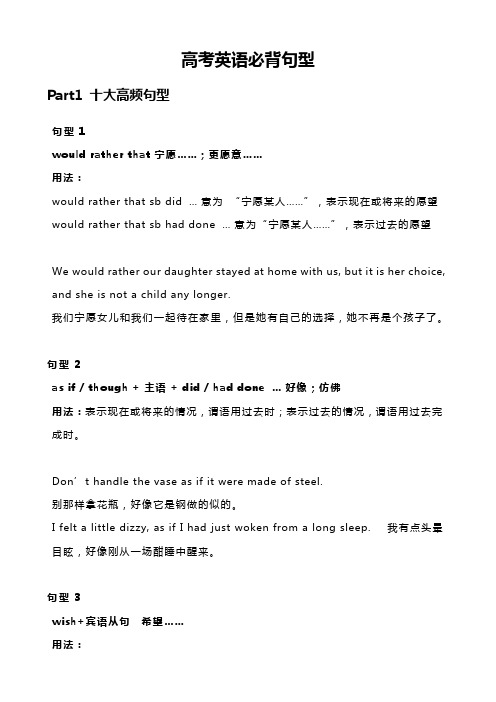
高考英语必背句型Part1 十大高频句型句型1would rather that宁愿……;更愿意……用法:would rather that sb did …意为“宁愿某人……”,表示现在或将来的愿望would rather that sb had done …意为“宁愿某人……”,表示过去的愿望We would rather our daughter stayed at home with us, but it is her choice, and she is not a child any longer.我们宁愿女儿和我们一起待在家里,但是她有自己的选择,她不再是个孩子了。
句型2as if / though +主语+ did / had done …好像;仿佛用法:表示现在或将来的情况,谓语用过去时;表示过去的情况,谓语用过去完成时。
Don’t handle the vase as if it were made of steel.别那样拿花瓶,好像它是钢做的似的。
I felt a little dizzy, as if I had just woken from a long sleep. 我有点头晕目眩,好像刚从一场酣睡中醒来。
句型3wish+宾语从句希望……用法:表示现在的愿望:主语 + 过去时表示过去的愿望:主语 + had done表示将来的愿望:主语 + would / could doEllen is a fantastic dancer. I wish I danced as well as her.Ellen的舞跳得非常好。
我希望我也能跳得和她一样好。
I wish I had been at my sister’s wedding last Tuesday, but I was on a business trip in New York then.我希望我上周二参加了姐姐的婚礼,可是我当时在纽约出差。
高考英语读后续写七大高级句式精讲

高考英语读后续写七大高级句式精讲01主旨升华式结尾 主旨升华式结尾是指在读后续写结尾时,通过一句高度凝练的话,对主题进行升华,使文章主题上升到一定高度,起到画龙点睛的作用,并给读者以启示,这种话往往是一些名言或谚语。
读后续写采用住址生化式结尾可以使阅卷老师赏心悦目。
1. 有志者事竟成。
[追逐梦想类]2. 通往成功的道路不会平坦,那里充满挑战和艰辛。
[努力奋斗类]3. 如果你因为这些困难而灰心丧气,你就不会获得成功。
[努力奋斗类]4. 战胜烈惧和实现目标需要决心和乐观。
[战胜自我类]Where there is a will, there is a way.The journey to success is not smooth. It is full of challenges and difficulties.If you get disheartened or discouraged by these hurdles, you can not attain success. Determination and optimism are what it takes to conquer your fear and accomplish your goal.5. 事实上,每个人都有某种天赋。
勇敢,直面困难并付出努力,你终将会创造奇迹。
[努力奋斗类]6. 珍惜每一天,追寻你的梦想。
只要你抓住每一个机会,充分利用机会,你就有机会实现梦想。
[追逐梦想类]7. 一个人可以走得很远,但一群人可以走得更远。
[团队合作类]Actually, each individual possesses a talent for something. Be brave, rise to setbacks/obstacles, and make efforts. You will end up creating miracles.Seize the day, and chase your dreams. As long as you grasp every opportunity and take full advantage of it, you will stand a chance of realizing your dreams.One person can go far, but a group of people can travel farther.1. 赠人玫瑰,手有余香。
高考英语80个重要句型精讲八

2010年03月17日来源:本站原创作者:远景教育编辑组关键词:高考英语,高考英语句型70、表示“也、同样”的句型(1) too 用于肯定例:I like the book, too. 我也喜欢这本书。
(2) also 用于陈述句例:She also speaks a little Italian. 她也会说一点意大利语。
(3) either 用于否定句例:Peter can't go and I can't either. Peter 不能去,我也不能。
(4) so 用于肯定的倒装句例:You speak English well, so does he.你的英语讲得很好,他讲得也不错。
.(5) neither/nor 用于否定的倒装句例:I have never heard of such a thing, Neither has she.我从来没有听说这件事,她也没有。
Tom didn’t finish his homework. Nor did Jane.汤姆没有完成作业,Jane 也没有。
(6) as well 用于句末例:He knows German as well. 他也懂德语。
(7) so it is/was with = so it is/was the same with 用于包含不同种类的动词例:Jack is a student and studies in China. So it is with Green.Jack是一个学生,在中国学习,Green也是如此。
(8) The same is true of……,例:The music is dull and uninspiring, and the same is true of the acting.那音乐单调,缺少激情;那表演也是如此。
(9) The same can be said of…… (……也是如此).例:The same can be said of our country, also a developing one.我们的国家也是如此,一个发展中国家。
高考英语语法精讲强调句句型考点讲义

2024年高考英语语法精讲:强调句句型+考点一、强调句型1. 陈述句的强调句型:It is/ was + 被强调部分(通常是主语、宾语或状语)+ that/ who(当强调主语且主语指人)+ 其他部分。
It was yesterday that he met Li Ping.2. 一般疑问句的强调句型:同上,只是把is/ was提到it前面。
e.g. Was it yesterday that he met Li Ping?3. 特殊疑问句的强调句型:被强调部分(通常是疑问代词或疑问副词)+ is/ was + it + that/ who + 其他部分?e.g. When and where was it that you were born?4. 强调句成分:例如针对I met Li Ming at the railway station yesterday.句子进行强调。
强调主语:It was I that (who) met Li Ming at the railway station yesterday.强调宾语:It was Li Ming that I met at the railway station yesterday.强调地点状语:It was at the railway station that I met Li Ming yesterday.强调时间状语:It was yesterday that I met Li Ming at the railway station.5. 注意:构成强调句的it本身没有词义;强调句中的连接词一般只用that, who,即使在强调时间状语和地点状语时也如此,that,who不可省略;强调句中的时态只用两种,一般现在时和一般过去时。
原句谓语动词是一般过去时、过去完成时和过去进行时,用It was ……,其余的时态用It is …… .二、not … until …句型的强调句1. 句型为:It is/ was not until + 被强调部分 + that + 其他部分e.g. 普通句:He didn't go to bed until/ till his wife came back.强调句:It was not until his wife came back that he went to bed.2. 注意:此句型只用until,不用till.但如果不是强调句型,till, until可通用;因为句型中It is/ was not ……已经是否定句了,that后面的从句要用肯定句,切勿再用否定句了。
高考英语作文重点句型80句
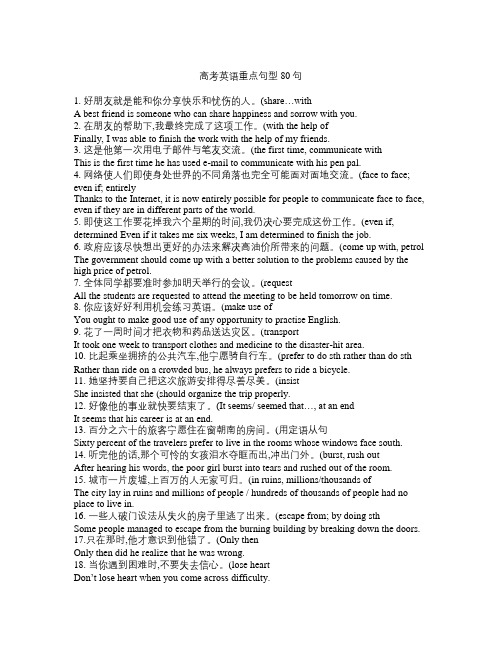
高考英语重点句型80句1. 好朋友就是能和你分享快乐和忧伤的人。
(share…withA best friend is someone who can share happiness and sorrow with you.2. 在朋友的帮助下,我最终完成了这项工作。
(with the help ofFinally, I was able to finish the work with the help of my friends.3. 这是他第一次用电子邮件与笔友交流。
(the first time, communicate withThis is the first time he has used e-mail to communicate with his pen pal.4. 网络使人们即使身处世界的不同角落也完全可能面对面地交流。
(face to face; even if; entirelyThanks to the Internet, it is now entirely possible for people to communicate face to face, even if they are in different parts of the world.5. 即使这工作要花掉我六个星期的时间,我仍决心要完成这份工作。
(even if, determined Even if it takes me six weeks, I am determined to finish the job.6. 政府应该尽快想出更好的办法来解决高油价所带来的问题。
(come up with, petrol The government should come up with a better solution to the problems caused by the high price of petrol.7. 全体同学都要准时参加明天举行的会议。
高考英语必考考点汇总
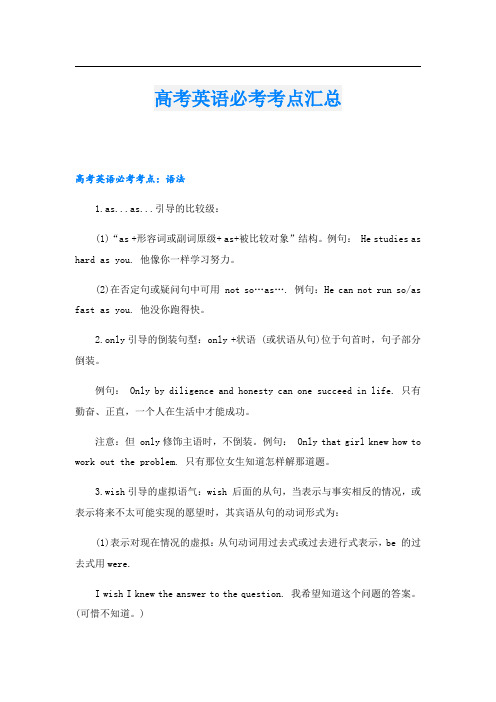
高考英语必考考点汇总高考英语必考考点:语法1.as...as...引导的比较级:(1)“as +形容词或副词原级+ as+被比较对象”结构。
例句: He studies as hard as you. 他像你一样学习努力。
(2)在否定句或疑问句中可用 not so…as…. 例句:He can not run so/as fast as you. 他没你跑得快。
2.only引导的倒装句型:only +状语 (或状语从句)位于句首时,句子部分倒装。
例句: Only by diligence and honesty can one succeed in life. 只有勤奋、正直,一个人在生活中才能成功。
注意:但 only修饰主语时,不倒装。
例句: Only that girl knew how to work out the problem. 只有那位女生知道怎样解那道题。
3.wish引导的虚拟语气:wish 后面的从句,当表示与事实相反的情况,或表示将来不太可能实现的愿望时,其宾语从句的动词形式为:(1)表示对现在情况的虚拟:从句动词用过去式或过去进行式表示,be 的过去式用were.I wish I knew the answer to the question. 我希望知道这个问题的答案。
(可惜不知道。
)(2)表示对过去情况的虚拟:从句动词用had +过去分词。
I wish (that) I hadnt wasted so much time. 我后悔不该浪费这么多时间。
( 实际上已经浪费掉了。
)(3)表示对将来的主观愿望:谓语动词形式为“would/ should/ could/ might +动词原形”。
在这种情况下,主句的主语与从句的主语不能相同,因为主句的主语所期望的从句动作能否实现,取决于从句主语的态度或意愿(非动作名词除外) 。
I wish it would stop raining. 但愿雨能停止。
高中英语高考必考80个重要句型精讲知识点分析

高中80个重要句型句型1would rather that somebody did…“宁愿……;更愿意……”(表示现在或将来的愿望) would rather that somebody had done…“宁愿……;更愿意……”(表示过去的愿望)[例句]I’d rather you posted the letter right now. 我想让你现在去寄信。
I’d rather you were not a celebrated actor. In that case, we could spend more time together.我到情愿你不是个知名演员,这样我们可以有更多的时间在一起。
I’d rather that I hadn’t seen her yesterday. 我情愿昨天没有看到她。
句型2as if/though+主语+did/had done…好像……(表示现在或将来的情况用过去时;表示过去的情况用过去完成时)[参考句型4][例句]Our head teacher treats us as if we were her own children, so all the students in our class think highly of her.Alan talked about Rome as if he had been there. Alan谈起罗马来就好像他去过那里似的。
句型3“wish +宾语从句”,表示不大可能实现的愿望表示现在的愿望:主语+过去时;表示过去的愿望:主语+had done;表示将来的愿望:主语+would/could do[例句]How I wish we students had more free time to relax ourselves! 我们学生多么希望有更多的自由时间放松自己!I failed in the maths exam. How I wish I hadn’t wasted so much time playing!What a pity you can’t go to the party. How I wish I could dance with you at the party!句型4It’s high/about time that somebody did (should do) (should通常不省略) …早就该……[例句]It’s time that you went to school.= It’s time that you should go to school.It’s high time that we did something to improve our environment. 该是我们为环保做些事情了。
高考英语必考重点句型归纳
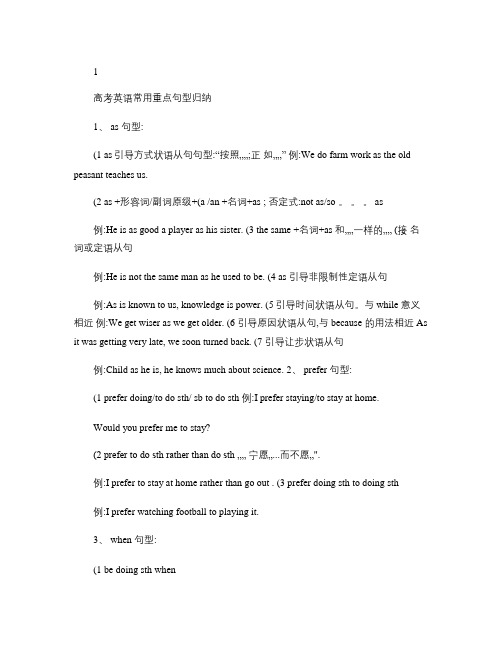
1高考英语常用重点句型归纳1、 as 句型:(1 as引导方式状语从句句型:“按照……;正如……” 例:We do farm work as the old peasant teaches us.(2 as +形容词/副词原级+(a /an +名词+as ; 否定式:not as/so 。
as例:He is as good a player as his sister. (3 the same +名词+as 和……一样的…… (接名词或定语从句例:He is not the same man as he used to be. (4 as 引导非限制性定语从句例:As is known to us, knowledge is power. (5引导时间状语从句。
与 while 意义相近例:We get wiser as we get older. (6 引导原因状语从句,与 because 的用法相近 As it was getting very late, we soon turned back. (7 引导让步状语从句例:Child as he is, he knows much about science. 2、 prefer 句型:(1 prefer doing/to do sth/ sb to do sth 例:I prefer staying/to stay at home.Would you prefer me to stay?(2 prefer to do sth rather than do sth …… 宁愿…...而不愿…".例:I prefer to stay at home rather than go out . (3 prefer doing sth to doing sth例:I prefer watching football to playing it.3、 when 句型:(1 be doing sth when例:He was still smiling when the door opened and his wife came in. (2 be about to do sth when 例:We were about to start when it began to rain. (3 hardly … when…例:Hardly had I got home when it bagan to rain. 4、 seem 句型 :(1 It +seems(to sb + that从句例:It seemed that everyone was satisfied. 例:It seems to me that she is right. (2 There seems to be ----例:There seems to be a heavy rain. (3 It seems as if ----例:It seemed that she couldn't come to class . (4 sb seems(edto do/to be doing/have done sth.5、 what 引导的名词性从句(1 what 引导主语从句例:What surprised me is that everybody seemed to be very indifferent to her. (2 what 引导宾语从句例:We can learn what we do not know. (3 what 引导表语从句例:That is what I want. 6、 too 句型:(1 too. . . to do sth.太。
高考英语必考语法大汇总
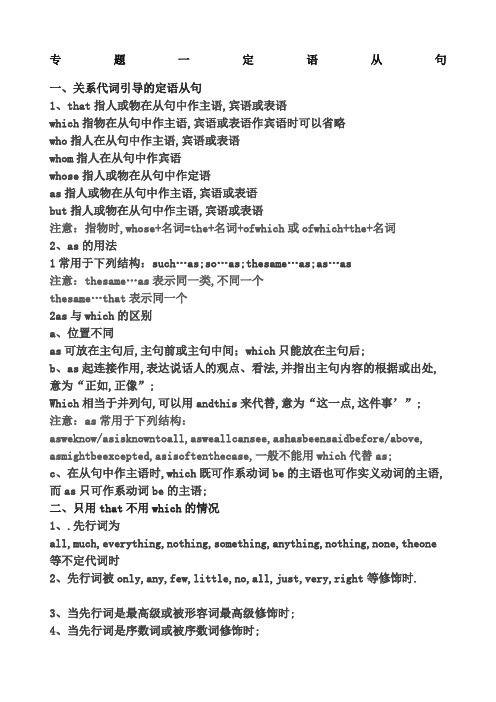
专题一定语从句一、关系代词引导的定语从句1、that指人或物在从句中作主语,宾语或表语which指物在从句中作主语,宾语或表语作宾语时可以省略who指人在从句中作主语,宾语或表语whom指人在从句中作宾语whose指人或物在从句中作定语as指人或物在从句中作主语,宾语或表语but指人或物在从句中作主语,宾语或表语注意:指物时,whose+名词=the+名词+ofwhich或ofwhich+the+名词2、as的用法1常用于下列结构:such…as;so…as;thesame…as;as…as注意:thesame…as表示同一类,不同一个thesame…that表示同一个2as与which的区别a、位置不同as可放在主句后,主句前或主句中间;which只能放在主句后;b、as起连接作用,表达说话人的观点、看法,并指出主句内容的根据或出处,意为“正如,正像”;Which相当于并列句,可以用andthis来代替,意为“这一点,这件事’”;注意:as常用于下列结构:asweknow/asisknowntoall,asweallcansee,ashasbeensaidbefore/above, asmightbeexcepted,asisoftenthecase,一般不能用which代替as;c、在从句中作主语时,which既可作系动词be的主语也可作实义动词的主语,而as只可作系动词be的主语;二、只用that不用which的情况1、.先行词为all,much,everything,nothing,something,anything,nothing,none,theone 等不定代词时2、先行词被only,any,few,little,no,all,just,very,right等修饰时.3、当先行词是最高级或被形容词最高级修饰时;4、当先行词是序数词或被序数词修饰时;5、当先行词是数词时.6、当先行词既指人又指物时;7、如有两个定语从句,其中一个关系代词已用which,另一个关系代词则宜用that;8、主句是Therebe结构,修饰其主语的定语从句宜用that作关系代词;9、被修饰成分为表语,或者关系代词本身是定语从句的表语时,该关系代词宜用that;10、先行词为what,关系代词用that;11、有时为了避免重复而使用that引导定语从句;三、只用which不用that的情况1、当介词放在关系代词之前时;2、在非限制性定语从句中;3、当关系代词指整个主句的概念时;四、只用who不用that的情况1、当先行词是one,ones,anyone或those时;2、therebe结构中;3、当先行词是人,后面有较长修饰语时;4、为了避免重复或引起歧义;5、当先行词是I,you,he,they等时常用于谚语中;6、先行词是指成员的集体名词;7、who可以引导非限制性定语从句;8、先行词是拟人化的名词;9、先行词指特定的人时用who,不指特定的人用that;五、关系副词引导的定语从句1、when时间状语注意:It/Ihis/That+be+thefirst/second/lasttimethat…只能用that,that 可以省略,从句用相应的完成时;2、where地点状语注意:当先行词为模糊的地点时,如,case,position,stage,scene,spot,activity,family,job等名词时用where.3、why原因状语先行词为reason;六、介词与关系代词1、介词如何确定1依据定语从句中动词的习惯搭配来确定2依据先行词的习惯搭配来确定3根据意思来确定4为了强调某一名词,不定式前加上关系词2、关系代词作介词的宾语时,介词的位置1whom和which可以和介词一起放在先行词和从句之间,也可以把介词放在从句中有关动词的后面;2含有介词的短语动词一般不拆开,介词仍放在动词的后面;3关系代词that在从句中作介词宾语时,介词不能放在它的前面,只能放在从句中有关动词的后面;4关系代词whose也可以在从句中与它所修饰的名词一起作介词宾语;3、“名词/数词/代词+介词+关系代词”结构常见的形式有:名词/one/two/some/none/all/both/several/many/most/afew/alittle/the+比较级/the+最高级…+of+which/whom;七、定语从句中的主谓一致1、关系代词作从句的主语时,从句中谓语动词的人称和数要与先行词保持一致,先行词是句子时,从句的谓语动词用单数形式;2、“oneof+复数名词”位于关系代词前作先行词时,关系代词在从句中作主语,从句的动词通常用复数,但当one前有the,theonly,thevery等修饰时,从句的谓语动词要用单数;八、注意way和time后接定语从句的情况1、当先行词是way,且意为“方式、方法”时,引导定语从句的关系词有下列三种形式:that/inwhich/不填;注意:关系词在从句中必须作状语;如果关系词在从句中作主语或宾语,按正常的定语从句分析;2、当先行词是time时,若time作“次数”讲,应用that引导定语从句,that 可省略;若time作“一段时间”讲,应用关系副词when或介词at/during+which引导定语从句;专题二状语从句一、时间状语从句1、when的用法1when既可引导一个持续性动作,也可引导一个短暂性动作,可用于表示主句和从句动作同时发生或从句动作先于主句动作,有时还可表示从句动作后于主句,意为“当;;;时候”;2when在beabouttodo;;;when;;;,bedoing;;;when;;;,haddone;;;when;;;,beonone’sway;;;when;;;,beonthepointofdoing;;;when;;;等结构中,作“那时突然”讲;3when“既然、鉴于;尽管,虽然位于主句之后;如果”2、while的用法1表示“当;;;时候”,引导的动作必须是延续性的;2用作并列连词,表示相对关系“然而”;3引导让步状语从句,相当于although,意为“虽然”,位于主句前;4引导条件状语从句,相当于as/solongas,意为“只要”;3、as的用法1表示“当;;;时候”,强调同时发生,不指先后;2说明两种正在发展或变化的情况,表示“随着”,表示时间的推移;3表示“一边;;;一边;;;”;4强调两个动作紧接着发生;5表示“虽然,尽管”;6其他含义“正如,正像”,“作为”,“由于,因为”;4、before的用法1一般意为“在;;;之前”“;;;才”,“;;;就”“还没有;;;”“免得”“不知不觉”“宁可,宁愿”,“否则,要不然”;2It+willbe/was+时间段+before+一般现在时/一般过去时;在肯定句中,意为“多长时间之后才”;在否定句中,意为“用不了多长时间就”;5、until和till1与肯定句连用,必须是延续性动词;2与否定句连用,必须是非延续性动词,表示“直到;;;才,在;;;之前不;;;”;注意:notuntil可用于强调句和倒装句强调句:Itis/wasnotuntil…that…倒装句:notuntil放句首时,主句要部分倒装;6、since的用法1since后是非延续性动词,时间起点从该动作发生算起,意为“做某事多久了”;since后是延续性动词,时间起点从该动作结束算起,意为“不做某事已有多长时间”;2Itis/hasbeen+时间段+since+一般过去时7、表示“一......就......”的句型1assoonas,once,immediately,directly,instantly,themoment,theminute等引导的从句都表示从句的动作一发生,主句的动作随即发生,常译作“一;;;就;;;”,这类从句中,经常用一般现在时态代替将来时态;2ondoingsth.或“onone’s+名词”作时间状语;8、有些名词和副词可以起连接词的作用,引导时间状语从句;注意:时间状语从句中不用将来时态;若要表示将来时间,可用一般现在时态表示;但when引导名词性从句时,从句中要使用将来时;二、地点状语从句1、地点状语从句由where,wherever引导;注意:where与where的区别:Where表特定的地点,而wherever表示非特定的地点;Wherever=to/atanyplacewhere2、地点状语从句与定语从句的区别Where引导定语从句时,从句前应有一个表示地点的名词作先行词;而状语从句前则无先行词;三、原因状语从句引导词:because,since,as,nowthat,notthat…,butthat…,seeingthat,considering that,inthat注意:for也可以表示原因,属并列连词,但不是说明直接原因,而是对某种情况加以推断,用于表示补充说明理由;四、目的状语从句引导词:so,sothat,inorderthat,that,totheendthat以便,为了,incase,forfearthat,lest以免,以防,目的状语从句中通常有情态动词can,could,may,might,should,would等;注意:1、incase还可表示“万一,假如”;2、目的状语从句可以用soasto,inorderto等不定式代替,但主句和从句的主语必须一致;五、结果状语从句引导词:so...that如此;;;以至于;;;,such...that如此;;;以至于;;;,sothat结果是,withtheresultthat所以,结果是注意:1so...that与such...that的区别So+形容词such+a/an+形容词+单数名词So+形容词+a/an+单数名词such+形容词+复数名词So+副词such+形容词+不可数名词Somany/few+复数名词Somuch/little+不可数名词2sothat引导的目的状语从句与sothat引导的结果状语从句目的状语从句一般使用情态动词,结果状语从句一般不使用情态动词;结果状语从句常常用逗号与主句分开;3so...that与so...as;such...that与such...asSo...that/such...that为结果状语从句;so...as/such...as为定语从句;六、条件状语从句引导词:if如果,unless除非,ifonly只要,但愿,onlyif只有,incase万一,suppose/supposingthat假设,provided/providingthat只要,假若,onconditionthat要是,在;;;条件下,so/aslongas只要,let's/letussay假设七、方式状语从句引导词:as像;;;一样,正如;;;,asif/asthough好像,宛如注意:1、固定句型AistoBwhatCistoD.意为“A对B而言正如C对D一样”;2、asif,asthough引导的从句若与事实相反,用虚拟语气;若与事实相符,不用虚拟语气;八、让步状语从句引导词:though/although/as虽然,尽管,evenif/though即使,尽管,whether/nomatterwhether...ornot不管;;;是否,不管是;;;还是wh-ever/nomatterwh-无论;;;注意:1though,although,as的区别A、Though,although的主句中可以用yet,still,nevertheless,但不可使用but;B、though引导的从句可以倒装,也可以不倒装;as引导的从句必须倒装;although引导的从句不能倒装;其结构为:形容词/分词/副词/动词原形/名词无冠词+as/though+主语+谓语……一、that从句1、主语从句1that从句作主语时,常用it作形式主语,常见的句型有:It+be+形容词obvious,true,natural,surprising,good,wonderful,funny,possible,likel y,certain,probable,etc.+that从句It+be+名词词组nowonder,anhonor,agoodthing,apity,nosurprise,etc.+that从句It+be+过去分词said,reported,thought,expected,decided,announced,arranged,etc.+that 从句2that可以省略,但that从句位于句首时,that不能省略;2、宾语从句1常见的可以接that从句作宾语的动词有see,say,know,imagine,discover,believe,tell,show,think,consider,besu re,beafraid等;在可以接复合宾语的动词之后,如think,make,consider等,可以用it作形式宾语;2That从句一般不能充当介词宾语,偶尔可作except,in的宾语;3、表语从句that不可省略4、同位语从句连词that引导同位语从句时,应在某些抽象名词之后,如:fact,hope,desire,thought,suggestion,idea,news,problem,possibility等,对前面的名词起补充说明的作用,that在从句中不担当任何成分,不能省略;二、whether/if从句1、在表语从句和同位语从句中只能用whether不能用if;当主语从句放于句首时,只能用whether不用if;当it作形式主语,主语从句放在句末时用whether或if均可;discuss后引导宾语从句时,必须用whether;2、在宾语从句中:1及物动词后:whether从句中不能有否定式,宾语从句为否定句时用if;if 不能与ornot连用,但可以用whetherornot;whether后可以加不定式;2介词后:只能用whether,不用if;三、特殊疑问词引导的从句1、主语从句:特殊疑问词引导主语从句时,常用it作形式主语;2、宾语从句1常见的能接特殊疑问词引导的宾语从句的动词有see,tell,ask,answer,know,decide,findout,imagine,suggest,doubt,wonde r,show,discuss,understand,inform,advise等;2作介词宾语;3、同位语从句、表语从句四、名词性关系从句What=thethingswhich/that,whoever=anyonewho,whichever=anyone/anythin gthat,whatever=anythingthat,where=theplacewhere,when=thetimewhen2、表示眼下或目前等现在时间所发生的动作或存在的状态,这种状态带有一定的持续性;3、表示客观事实或普遍真理;4、书报的标题,故事的叙述,小说、戏剧、电影等情节介绍,图片的说明等;5、时间表、时刻表、日程表、节目单、课程表等按规定将要发生的动作,只限于go,arrive,leave,start,stay,return,begin,come等动词;6、在时间、条件、方式、让步状语从句中,表示将来的动作;注意:一般现在时可以用于定语从句或宾语从句中表示将来;7、用在某些表达中,表示现在正在发生的动作或存在的状态; HerecomesthebusHowitrains二、一般过去时1、表示在过去某一时间点发生的动作或所处的状态,与现在没有关系;常用的时间状语有:yesterday,lastnight,atthattime等;2、表示在过去某一段时间里反复出现的动作或状态,与现在没有关系;3、用usedtodo或woulddo表示过去经常或反复发生的动作;4、有些情况发生的时间没清楚表明,但实际上是“刚才,刚刚”发生的,属于过去时间,应使用过去时态;常见的有Ididn’tknow…或Iforgot…等;5、一般过去时可与today,thisweek,thismonth等时间状语连用;三、一般将来时1、will/shalldo1表示将来会出现的动作或状态;常用的时间状语:thisevening,tomorrow,nextweek/month…,attheendofthisterm,inafewminu tes等;2表示将来经常发生的动作;3表示事物的固有属性或必然趋势、倾向;4表示说话过程中做出某种决定;注意:条件状语从句中的will表示“决心,意愿”,此时will是情态动词表示意愿;2、begoingtodo1表示已经决定或安排要做的事;2表示根据某种迹象认为在最近或将来将要发生的事;3、betodo1表示约定、计划或按职责、义务要求即将发生的动作;2表示说话人的意志、意图、职责、义务、命令;3表示注定要发生的事情;4、beabouttodo1表示即将发生的动作,意为“正要,即将”;2不可与表示具体的将来时间的副词或副词性短语连用,但可以同由as或when引导的时间状语从句连用;5、某些动词的现在进行时表示即将发生的动作;四、过去将来时1、would/shoulddo表示从过去某一时间来看将要发生的动作或将要存在的状态;通常用于其主句的谓语为过去时态的宾语从句中;2、were/wastodo表示过去将来时间的安排,如果这个安排后来被取消,没有实现,则用was/weretohavedone表示;五、现在进行时1、表示说话时正在进行而尚未完成的动作或状态;2、表示现阶段一直在进行的动作,但说话时不一定正在进行;3、有时可表示即将发生的动作只限于go,come,stay,leave,start,begin,arrive,return,fly,drive等动词,这时常有一个表示将来时间的状语;4、常与always,forever,constantly,continually,allthetime等时间副词连用,表示反复发生的或习惯性的动作,常表示不满、抱怨或赞赏等情感;5、有些表示感觉、情感的动词不能用进行时,它们是:know,understand,love,like,hate,feel,desire,wish,want,refuse,remembe r,hear,see,have等,这些动词一般不用进行时,通常用一般现在时态,表示说话时发生的动作;六、过去进行时1、表示过去某一时刻或某一时间内正在进行的动作;这一特定的过去时间通常有时间状语从句或由上下文来表示;2、表示过去某一阶段一直在进行的动作;但说话时不一定正在进行;3、表示从过去某一时间的角度看将要发生的动作,用于某些动词;见现在进行时34、与always,frequently等副词连用,表示感情色彩;七、将来进行时1、表示在将来某一时刻或某一时间段正在进行的动作;2、表示根据计划或安排在将来某一时刻正在进行的动作;此时一般有具体的时间状语;2、重复的动作表示感情色彩;表示一直到说话时为止的一段时间内一再重复的动作;3、现在完成时和现在完成进行时的区别1表示动作已完成,着重结果;现在完成进行时表示动作的进行,强调动作的持续性;2状态动词、知觉动词或情态动词如:see,feel,know,love等,不用于现在完成进行时,但可用于现在完成时;十、过去完成时1、表示在过去某一时刻或动作以前已经完成了的动作,即“过去的过去”;----|-----------|----------|-------->过去完成过去现在注意:在含有时间状语从句的复合句中,若两个动作紧接着发生,则不需用过去完成时,尤其是在含有before和after的复合句中,常用一般过去时代替过去完成时;2、表示未曾实现的希望、打算、意图、诺言等;常用hadhoped/planned/meant/intended/thought/wanted/expected等或用上述动词过去式接不定式表示即:hoped/planned…+todo;3、过去完成时用于hardly…when,nosooner…than等固定句型中;十一、不能用被动语态的情况1、therebe结构及所有的不及物动词或词组充当谓语时,无被动语态;2、系动词无被动语态;3、一些表示状态的及物动词,如cost,have,own,possess等不能用被动语态;4、表示“希望、意图”的动词,如wish,want,hope,like,love,hate等不能变被动语态;5、当及物动词leave,enter,reach等的宾语是表示地点和处所包括组织、团体、军队、国家等的名词时,不可变为被动语态;十二、主动形式表被动意义1、某些动词形式上主动,但含有被动意思,往往表示主语本身的性质,而且主语应该是事物;2、在“have+宾语+todo”结构中,当不定式的逻辑主语在句中出现时,不定式用主动语态,否则用被动语态;3、在“be+形容词+todo”中,不定式的逻辑宾语是句子的主语,用主动表被动;4、在某些词组中,用动词的主动形式表被动;1beworthdoing2want,require,need后面的动名词用主动形式表示被动含义;3with复合结构十三、被动形式表示主动意义的几种情况beseated坐着,behidden躲藏,belost迷路,bedrunk喝醉,bedressed穿着专题五情态动词一、can和could1、can的用法1表示体力和脑力方面的能力;2表示对现在的动作或状态进行主观的猜测,主要用在否定句和疑问句中;3表示可能性,理论上的可能性,意为“有时候可能会”,可用于肯定句;4表示允许,意思与may接近;5表示说话人的推测、怀疑、惊异、猜测或不肯定等,主要用于否定句、疑问句或感叹句中;6can的特殊句型cannot…too/enough表示“无论怎么;;;也不过分”;“越;;;越好”; cannotbut+dosth.表示“不得不,只好”;2、could的用法1表示能力,指的是过去时间;2表示允许,指的是过去时间;3表示可能,可以指过去时间,也可以指现在时间,表示语气缓和;4委婉客气地提出问题或陈述看法,指的是现在时间;主要用于疑问句,回答时用can;3、can与could的区别can表推测时只用于否定句和疑问句could无此限制;couldn’t的可能性比can’t小;4、can与beableto的区别1现在时:无区别,但后者不常用;2完成时;can没有完成时,此时要用havehas,hadbeenableto;3将来时:can没有将来时,要用willbeableto;4过去时:could表示一般能力,was/wereableto表示在具体场合通过努力成功做成某事的能力;二、may和might1、may的用法1表示询问或说明一件事可不可以做;2表示一件事或许会发生或某种情况可能会存在,通常用在肯定句和否定句中;注意:表示可能性时,can’t语气强,表示“不可能”,maynot语气弱,表示“可能不”;2、might的用法1表示询问或允许,指的是过去时间;2表示可能发生的事,可以指过去时间,也可以指现在时间,语气更加不肯定,可能性比may小一些;3、may与might的特殊用法1“may+主语+动词原形”表示祝愿;2“may/mightwell+动词原形”表示完全能,很可能;3“may/mightaswell+动词原形”表示最好,满可以,倒不如;4maybe是“情态动词+系动词be”结构,表示“可能有,可能在”,否定式为maynotbe;maybe是一个词,为副词,意为“大概,或许,可能”,在句中作状语;三、must的用法1、表示“必须”,多强调说话人的主观看法;2、must和haveto的区别:1must表示说话人的义务或说话人主观认为“必须,应当”做某事;haveto表示由于某种外界原因而“必须,不得不”做某事;即must侧重说明主观看法,haveto强调客观需要;2must只有一种形式,可用于现在、过去或将来时,但haveto有不同的形式,可用于不同的时态;3在否定句中,don’tneedto,don’thaveto,needn’t表示没有义务;mustn’t表示禁止;3、must的否定形式mustnot/mustn’t意为“不许,禁止”,表示绝对禁止;若表示“没必要,不必”,应使用needn’t或don’thaveto;注意:对must作否定回答时,不用mustn’t,用needn’t或don’thaveto;4、must表示“偏偏”,指令人不快的事情;5、must用来表示推测,意为i“准是,肯定是”,一般用于肯定句,肯定程度比may,might大的多;四、need的用法1、need用作情态动词,后面接动词原形,通常用在否定句和疑问句中;2、回答need时,肯定回答用must,否定回答用needn’t或don’thaveto;3、need用作实义动词时,有时态、人称和数的变化,后面加todo;4、needtodo和needdoingneedtodo中不定式的逻辑主语就是主句的主语;needdoing是主动形式表示被动含义,即need前的主语就是need后面的动词所表示的动作的承受者;注意:want和require作“需要”讲时,和need的用法相同;5、needn’thavedone与didn’tneedtodoneedn’thavedone表示过去本不必做但实际上却做了某事didn’tneedtodo表示过去不必做而实际上也没做某事五、dare的用法1、dare用作情态动词,后面接动词原形,通常用在否定句和疑问句和条件句中;它没有人称和数的变化,但有过去式dared;2、dare用作实义动词时,有时态、人称和数的变化,后面加todo;注意:1Idaresay意为“我认为,我相信,很可能”;2dare用作实义动词时,表示“敢冒危险,不俱”;3dare可用于激将或挑战;例:Hedaredmetojumpdown.六、will和would1、will的用法1可以表示主观意志、意愿,可用于各种人称;2可以表示经常性、习惯性、倾向性等,意为“经常,惯于,总是”;3表示命令说话这确信命令一定会得到执行或允诺;4will可用于祈使句的附加疑问句;5用于疑问句,表“邀请,请求”,常与第二人称you连用;2、would的用法1作为will的过去时态,用于过去时中,表示主观愿望或意志,意为“愿意,执意”;2用与第二人称,表示谦恭的请求或征求意见,比will更为客气;3表示过去的习惯,后接动词原形,意为“总是,总会”;4would表意愿用于词组中;Wouldlike“喜欢,想要”=wouldloveWouldrather“宁愿”;七、shall和should1、shall的用法1shall用于第一、三人称陈述句中,表示说话人征求对方的意见或向对方请示; 2shall用于第二、第三人称陈述句中,表示说话人给对方的命令、警告、允诺或威胁;3用于所有人称,表示规章、法令、预言等,可译为“必须”;2、should的用法1表示义务、责任或劝告、建议、命令等,意为“应该”;2表示有一定根据的推测、推论或可能性,意为“可能,该”肯定的语气没有must表推测时强;3多用于疑问句中,表示惊讶、难以相信或不应该的事;4oughtto和should的比较A、oughtto也可以表示推论、可能性,和should用法一样;B、在省略回答中,oughtto中的to可以省略;C、should和oughtto表示做正确的事情或理应做的事情;besupposedto意为“被期望,应该”,表示被期望发生或根据安排、要求做某事,或认为做某事是正常的;八、hadbetter意为“最好”,’dbetter为其缩写形式,其后续跟动词原形;注意:hadbetter的否定形式hadbetternot;九、usedto“过去常常”,仅用于过去时态中,通常用于所有人称;1、usedto+动词原形,表示过去有规律的习惯或过去某一时期的的状况,但现在已不存在;2、其反意疑问句简略回答中,也有两种形式:didn’t,usedn’t3、usedto和would的区别1usedto可表示过去经常发生的动作或存在的状态,而would仅表示过去习惯性或重复性的动作;2usedto强调过去的行为同现在的对比,含有“过去如此,现在已不再这样了”之意;Would仅表示过去习惯性动作,没有预先在对比的含义;3usedto不能跟表确定时间短的时间状语连用;4usedto可用于无人称句和存在句,而would则不可;4、usedto与beusedtodo和beusedtodoing1usedto表示“过去常常”隐含现在不这样了,其中to是不定式符号,后跟动词原形,仅用于过去时态;2be/get/becomeusedto表示“习惯于”时,意为“变得习惯于“或“开始习惯于”;3beusedtodo表示“被用来”;十、情态动词后的某些动词形式1、情态动词+havedone1“must+have+done”表示对过去事情的肯定推测,译成“一定做过某事”,该结构只用于肯定句;2“can't+have+done”表示对过去事情的否定推测,译成“不可能做过某事”; 3“can+have+done”表示对过去行为的怀疑,用于疑问句,译成“可能做过……吗”4“could+have+done”是虚拟语气,表示对过去事情的假设,意思是本来能够做某事而没有做;5“may+have+done”表示对发生过的事情的推测,意思是“可能已经”或“也许已经”,用于肯定句中;6“might+have+done”表示对过去事情的推测,might与may意思相同,多用于虚拟语气结构中;还可以表示“本来可能……”;7“would+have+done”虚拟语气,表示对过去事情的假设,意思是“本来会做”;8“should+have+done”意思是“本来应该做某事,而实际没做;”“shouldn't+have+done”表示本来不应该做某事,而实际做了;含有指责对方或自责的含意;9“oughtto+have+done”表示过去应该做而实际并没有做,译成“理应做……”,往往表示遗憾;与“should+have+done”用法基本一样;10“need+have+done”表示本来需要做某事而没有做;“needn't+have+done”则表示“本来不需要做某事而做了”;2、情态动词+bedoing:表示对现在正在做的事情的推测;十一、含有某些情态动词的反意疑问句1、must当must表示命令时,反意疑问句用needn’t;当must表示推测时,反意疑问句与实际情况保持一致,即与把must删掉后的陈述句的反意疑问句保持一致;2、can’t当can’t表示没能力做某事时,反意疑问句用cansb.当can’t用于表推测时,反意疑问句由实际情况决定,即由去掉can’t后的真实陈述句决定;。
高考英语语法讲解

高考英语语法讲解高考英语语法是高考英语考试中的重点内容之一。
以下是一些常见的高考英语语法知识点的讲解:1. 时态:- 一般现在时:表示经常性或普遍性的动作或状态,如“I often go to school by bus.”- 现在进行时:表示现阶段正在进行的动作,如“I am studying for the exam.”- 一般过去时:表示过去某个时间发生的动作或状态,如“He played basketball yesterday.”- 过去进行时:表示过去某一时刻正在进行的动作,如“I was watching TV when he called me.”- 现在完成时:表示过去发生的动作对现在的影响,如“I have finished my homework.”- 一般将来时:表示将来某个时间要发生的动作或状态,如“We will go shopping tomorrow.”- 未来进行时:表示将来某一时刻正在进行的动作,如“I will be studying at this time tomorrow.”2. 从句:- 定语从句:用来修饰名词或代词的从句,如“The book that you lent me is very interesting.”- 名词性从句:在句子中充当主语、宾语或表语的从句,如“Whathe said is true.”- 状语从句:用来表示时间、原因、条件、目的等的从句,如“I will call you when I arrive.”3. 语态:- 主动语态:表示主语是动作的执行者,如“He wrote a letter.” - 被动语态:表示主语是动作的承受者,如“A letter was written by him.”4. 比较级和最高级:- 比较级:用来比较两个人或物的程度,如“He is taller than his brother.”- 最高级:用来比较三个或三个以上人或物的程度,如“She is the tallest girl in the class.”5. 可数与不可数名词:- 可数名词:表示可以数的名词,如“book, apple.”- 不可数名词:表示不可以数的名词,如“water, rice.”这些是高考英语语法的一些常见知识点,掌握好这些知识点将有助于提高英语语法的应用能力,从而在高考英语考试中取得好成绩。
- 1、下载文档前请自行甄别文档内容的完整性,平台不提供额外的编辑、内容补充、找答案等附加服务。
- 2、"仅部分预览"的文档,不可在线预览部分如存在完整性等问题,可反馈申请退款(可完整预览的文档不适用该条件!)。
- 3、如文档侵犯您的权益,请联系客服反馈,我们会尽快为您处理(人工客服工作时间:9:00-18:30)。
2010年03月17日来源:本站原创作者:远景教育编辑组关键词:高考英语,高考英语句型60、特殊的条件句:(1) Suppose/ Supposing ---, 假如……例:Suppose/Supposing he is absent, what shall we do?假如他缺席,我们怎么办?(2) On condition that只要……;如果……例:I'll come on condition that John is invited, too.如果约翰也被邀请,我就来。
(3) provided (that)/ providing ----- 只要……I will come provided (that) I am well enough. 只要我身体好,我一定来。
You may go out providing you do your homework first.只要你先做作业,你便可以外出。
(4) so/as long as例:As/So long as you work hard, you'll succeed in the end.只要你好好干,终究会成功的。
(5) 祈使句+and + 陈述句(表肯定)例:Give him an inch and he’ll take a mile.(= If you give him an inch, he’ll take a mile. ) 他会得寸进尺的。
(6) 祈使句+ or/otherwise +陈述句(表否定)例:Start at once, or / otherwise you’ll miss the train.(= If you don’t start at once, …)(= Unless you start at once, you’ll miss the train.)立即动身,否则你会错过那班火车的。
(7) …won't...unless... 除非……否则我不会…….例句:I won't write to him unless he writes to me first.我不会写信给他的,除非他先写给我.61、特殊的比较句型:(1) A differs from B in that…(A不同于B在于……)例:She differs from her sister in the colour of her eyes.她眼睛的颜色跟她姐姐不同。
(2) ...varies from person to person(……是因人而异的)例:The opinion of the problem varies from person to person.对这个问题的看法是因人而异的。
(3) A is superior(inferior) to B. A 优越于B例:The modal is technically superior to its competitors.这一款式在技术上优越于与之竞争的产品。
Some consider digital TV to be superior to satellite TV.(4) be different from例:Its meaning can be completely different from the meaning of its components. 它的意思有时候跟它的合成的意思完全不一样。
(5) be inferior to例:Modern music is often considered inferior to that of the past.现代音乐常被人认为不如过去的。
(6) A and B have sth in common. A 和B 有共同点。
例:The Japanese and Chinese cultures have a lot in common.日本与中国的文化具有许多相同点。
62、必须背诵的There be 句型:(1) There is no immediate solution to the problem .对于这个问题没有立即的解决的方案。
(2) There is no denying that + S + V ...(不可否认的...)例:There is no denying that the qualities of our living have gone from bad to worse. 不可否认的,我们的生活品质已经每况愈下。
(3) There is no doubt that... 毫无疑问,…….例句:There is no doubt that health is better than wealth.毫无疑问,健康胜于财富.(4) There's no point in... ……是无意义的.例句:There's no point in getting angry when things have happened.对已发生的事生气是没有意义的.(5) There's no way... ……绝不可能.例句:There's no way one could succeed without hard work.一个人不努力绝不可能成功.(6) There is no one but ~~~ (没有人不...)例句:There is no one but longs to go to college.没有人不渴望上大学。
(7)There is no need/use/harm/hurry in doing sth例:There is no need in spending money mending the broken car.没有必要花钱去修理那破车了。
There is no use in regretting when time passed by.时间过去了再后悔就没有用了。
There is no harm in using the environmentally friendly products.用环保产品是没有害处的。
There is no hurry in running to school for time is still enough.没有必要匆匆忙忙上学校,因为时间还充足呢。
(8) There no/some difficulty/trouble (in) doing sth例:There is no trouble in selling our car.我们毫不费力地卖了我们的车。
63、time 句型:(1) the first time 引导的状语从句例:I thought her nice and honest the first time I met her.第一次我见到她时,觉得她很诚实。
(2) (the) next time 引导的状语从句例:The harvest will have been got in (the) next time you come.你下次来时,庄稼已收好了。
(3) the last time 引导的状语从句例:What was the name of the hotel he had stayed in the last time he was in Cairo? 他上次来开罗时往的那家旅馆叫什么来着?(4) each time/every time 引导的状语从句例:Every time you get back at night, you drop your shoes on the floor.每次夜间回来,你总是把你的靴子朝地上一扔。
(5) It is /was the first/last/second /third time +从句(完成时态)例:This is the first time I have been here 这是我第一次到这儿。
(6)It is high time that sb did (should do) sth 该……的时候了。
例句:It is high time that we went to the classroom.该我们进教室的时候了。
(7) by the time + 从句就在……时候;到……时候为止例:We'll be ready by the time you get back.你回来的时候,我们将准备好了。
(8) It's time for sb to do sth例:It’s time for me to log off. 我该关机/下线了。
(9) It's time for sth例:It's time for lunch. 午餐的时间到了。
64、几种重要的表语从句句型:(1) The point is that ... 重点/关键是…….例句:The point is that you have to keep your promise to help her with her English. 关键是你得遵守诺言,帮她学习英语.(2) The chance is that … 有可能……例:The chance is that he will succeed. 他很有可能成功。
(3) The fact is that … 事实是……例:The fact is that he hasn’t yet recover from illness.事实是他还没有康复呢。
(4) The problem/question is that … 问题是……例:The question is whether we should ask them for help.问题是我们是否应该向他请求帮助。
(5)That is ---例:That is where Lu Xun used to live. 这是鲁迅过去住过的地方。
65、so/such that句型(1) so that (引导结果状语从句)结果……例:We were late so that the teacher was angry.我们迟到,使得教师生气了。
(2) so that = in order that (目的状语从句)以便,为了例:I hurried so that I wouldn't be late for class.为了上课不迟到,我匆忙起来。
In order that he should not be late, his mother woke him at 6.为了使他不致迟到,他母亲在6点钟叫醒了他。
